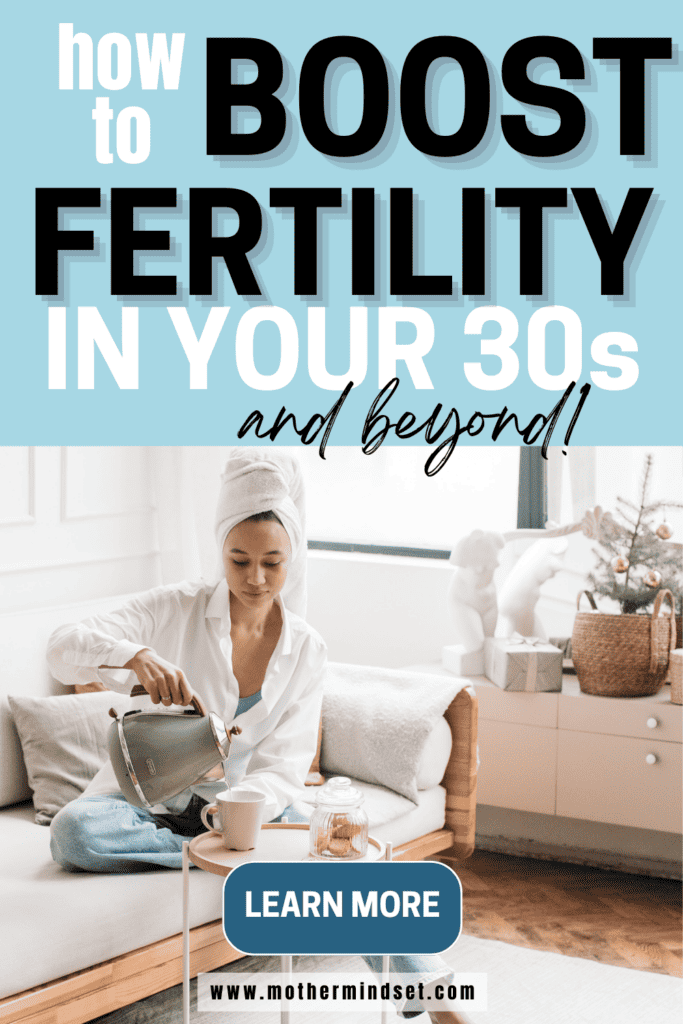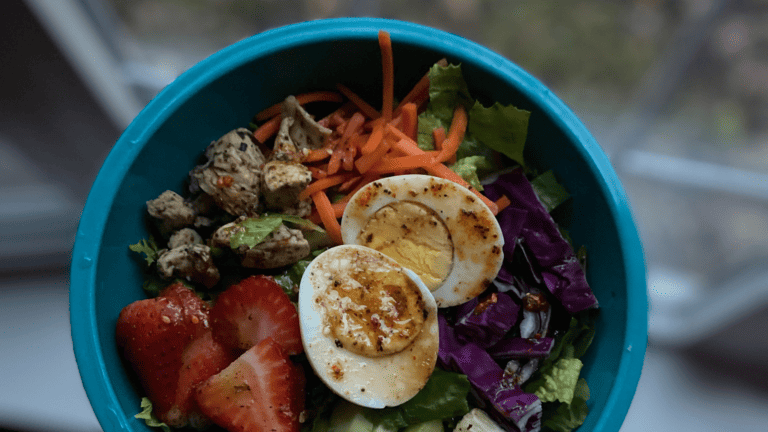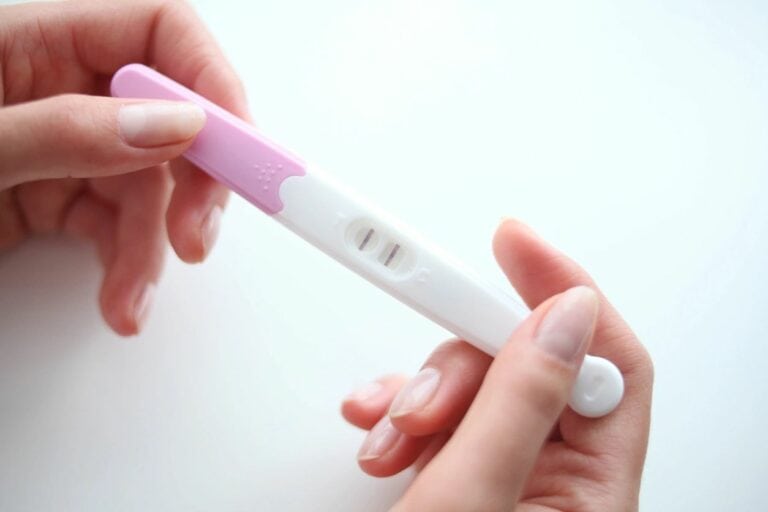7 Simple Tips For Getting Pregnant 30-35 (from Experience)

Last Updated on October 5, 2023 by Avi Steen
If you’re anything like me, you’ve probably spent your 20s embracing your inner wanderlust, exploring new career paths, and maybe even binge-watching a few too many Netflix series.
But now, in your 30s, there’s another adventure on your mind – expanding your family. And trust me, I get it – it’s a whole new level of adulting!
I’m not a doctor, but I am a 34-year-old mom and fertility coach with three little ones under four, and I’ve been through the rollercoaster of fertility concerns, ovulation trackers, and pregnancy tests that resemble a science experiment gone wrong.
Today, I’m here to share my experiences and offer you seven simple tips for navigating this journey with grace.
Whether you’re considering starting your family or you’re already on this exciting path, we’ll dive into essential topics like fertility treatments, female fertility, and improving your fertility for a healthy pregnancy.
Many women face fertility challenges during this decade, whether it’s due to PCOS, endometriosis, or any other number of conditions. The good news is that there are steps you can take to improve your chances of getting pregnant.
Why More Women Getting Pregnant in Their 30s
In today’s world, it’s not uncommon to see more and more women embracing motherhood in their 30s.
There is a multitude of reasons behind this, and it’s not just about waiting for the perfect partner or timing. Many of us have been busy chasing career dreams, establishing our financial footing, and taking the time to truly find a partner who’s the right fit for a lifetime of parenthood.
But what’s often not talked about enough are the ways these life choices can affect our fertility.
As we venture further into our 30s, questions about egg quality and the potential need for fertility treatment start to emerge.
In this post, we’ll dive deep into the factors that contribute to this shift in family planning and explore how they can impact our journey towards motherhood.

Things You Need to Know About Getting Pregnant in Your 30s
Age and fertility are two words that often find themselves in the same sentence when it comes to family planning. It’s no secret that, as women, we’re born with all the eggs we’ll ever have, and as we journey through our 30s, those eggs age with us.
This natural process can have a significant impact on our ability to conceive. So, let’s unpack a few key things you need to know about how aging affects fertility:
- Egg Quality: With each passing year, the quality of your eggs may decline, making it potentially more challenging to get pregnant naturally.
- Fertility Window: Your 30s are a crucial period for fertility, and it’s essential to understand the concept of a “biological clock.”
- Assisted Reproductive Technology: Options like IVF (In Vitro Fertilization) and other assisted reproductive technologies can be game-changers for many women.
- Health Matters: Your overall health, including lifestyle choices and pre-existing conditions, can play a significant role in your fertility journey.
Now that we’ve shed some light on these important aspects let’s dive into the heart of the matter—Simple Tips for Getting Pregnant in your 30s. These practical tips will help you navigate this exciting yet sometimes challenging path to motherhood.

Tips for Getting Pregnant in Your 30s
Okay, ladies, let’s talk real life here.
When it comes to taking the plunge into motherhood in your 30s, it’s about embracing a natural approach to your own wellness first. We know your menstrual cycle isn’t just dates; it’s the roadmap to this incredible journey.
So, here in this section, we’re diving into some savvy tips that are all about preparing your mind and body because I’ve been there, too.
These are the steps that can make all the difference:
- Combat Stress with Prayer
- Preventative Fertility Workup
- Eat Anti-Inflammatory Foods
- Supplement Appropriately
- Fuel Your Body by Eating Enough Food
- Consider Your Fitness Routine
- Optimize Your Fertile Window
Now, let’s break these down, girlfriend to girlfriend, so you can tackle this exciting journey with all the gusto it deserves.
1. Combat Stressors With Prayer
For many Christian women, the desire to welcome a child into their lives is profound and deeply rooted. However, when faced with the disappointments that often accompany the journey to parenthood, it can be challenging to navigate the sea of emotions.
In times like these, it’s crucial to recall that fear is not of God. Instead, we are called to trust in His greater plan and divine timing.
Turning to prayer as a means to combat the stressors that may arise on our fertility journey can be a source of solace and strength. It allows us to shift our focus from anxiety to the positive aspects of this path.
Through prayer, we find peace in the knowledge that God holds us in His loving embrace and will use this experience for our spiritual growth.
Rather than allowing worry to consume us, it is paramount that we approach each day with faith, not fear. By doing so, we can nurture our mental health and rise above the stress levels that most women face in similar situations.
Grab my fertility prayer checklist at https://mothermindset.com/prayer
2. Preventative Fertility Workup
As we age, it becomes increasingly important to take steps to maintain health to boost your fertility. One of the best ways to conserve our fertility potential is to go in for a preventative fertility workup and blood tests.
A fertility check-up is like a friendly chat with your doctor about prenatal care. During this chat, they’ll dig into all sorts of things – like checking for sneaky stuff such as hypothyroidism, Polycystic Ovarian Syndrome (PCOS), and endometriosis.
It’s all part of making sure everything’s okay down there.
So why do this? Well, not only will it ease your worries, but it can also catch any hiccups early on and get them sorted.
When you’re ready to dive into the exciting world of family planning or even explore fertility treatment options, you’ll be all set and ready to roll.
And don’t forget, if you’re thinking about fertility treatment, chatting with a fertility specialist is a smart move. They’re like your fertility BFFs, ready to guide you on this incredible journey.
3. Eat Anti-Inflammatory Foods
Eating an anti-inflammatory diet can seem like just another healthy diet fad, but the long-term health benefits are immeasurable.
Research shows that reducing inflammation with the right foods and supplements can significantly improve general well-being, from reducing stiffness and joint pain to boosting energy levels.
Not only that, but inflammation in the body can harm your reproductive health by upsetting the delicate balance of hormones and how your body reacts to them.
Many foods that reduce inflammation are simply whole foods that we already eat, such as whole grains, kale, chia seeds, and avocados, or spices such as turmeric and ginger.
By choosing recipes that highlight these ingredients, you can easily transform your diet into one that is both healthy for your fertility and delicious.
Remember that change does not happen overnight; small, sustainable changes can lead to big results over time.
4. Supplement Appropriately
Fertility journeys can be incredibly stressful and challenging, but we can make it a little bit easier by taking supplements like prenatal vitamins with folic acid.
Consider talking with your fertility specialist about any potential supplements that might help boost fertility in your 30s. There is no one-size-fits-all solution; understanding what works best for your body can go a long way toward helping you get pregnant.
Depending on your situation, supplements can help improve egg quality and balance hormones.

5. Fuel Your Body by Eating Enough Food
Eating nutritious meals and snacks is essential for women’s health and any fertility journey.
Fueling your body with the right foods helps regulate hormones and increases energy levels, both of which are important components of achieving a successful pregnancy.
On the other hand, inadequate nutrition can impair fertility in your 30s, resulting in problems while trying to conceive. Remember, the food you eat matters, and how much you eat is important, too!
Focus on consuming plenty of healthy whole foods. Our bodies need essential nutrients to optimize our fertility health and fuel our bodies for a healthy pregnancy.
6. Consider Your Fitness Routine
Getting into a daily fitness routine can help improve your chances of becoming pregnant. Exercise can stimulate the production of hormones that regulate ovulation and estrogen.
When you have too much body fat, your estrogen levels can become unbalanced, which in turn can lead to fertility issues like irregular menstrual cycles.
On the other hand, not enough lean muscle and fat can cause an imbalance in your hormones as well as a lack of ovulation and menstrual periods.
So, you should include a combination of strength training and cardio activities such as dancing, HIIT workouts, or even barre into your fitness routine to create a more balanced program overall.
7. Optimize Your Fertile Window
Last but certainly not least, make sure you’re making the most of your fertile window.
This is the time before ovulation that tends to get smaller as women age. So it’s critical to make sure you’re timing sex in this window to help you get pregnant.
Unlike men, who produce sperm daily, women have one single day of the month for ovulation, so timing is super important, especially after age 35.
Key Considerations For Successfully Getting Pregnant After 30
Now that we’ve explored those vital steps to boost fertility and conquer your pregnancy goals let’s chat about a few more nuggets of wisdom that didn’t quite fit into our earlier roadmap.
First off, remember that age is just a number.
While it’s true that fertility decreases as we get older, it doesn’t mean you can’t have a healthy pregnancy in your 30s or beyond. Keep the faith and stay positive – mindset plays a more significant role than you might think.
Also, don’t forget that the journey to parenthood can be a bumpy road, and that’s entirely okay.
Everyone’s story is unique, and what worked for one person might not be your perfect formula. Stay flexible, adapt, and lean on the support of loved ones and healthcare professionals when needed.
Lastly, embrace the adventure. Getting pregnant after 30 might come with its own set of challenges, but it’s also a remarkable journey filled with excitement, joy, and the promise of a beautiful family.
So, go ahead, keep those dreams alive, boost your fertility, and know that every step forward brings you closer to your little bundle of joy.

Wrapping Up Tips For Getting Pregnant After 30
The bottom line is that fertility in your 30s doesn’t have to be a lost cause. With the right lifestyle changes, you can increase your chances of conceiving naturally.
You can take charge of your fertility health by making sure you’re combatting stressors with prayer, eating anti-inflammatory foods, supplementing appropriately, and fueling your body.
Your fitness routine is also an important factor to consider when it comes to optimizing your fertility health. If you need help creating healthy habits around fertility or just want more support on your journey, join the Fertility Mindset membership today.

Octavia Steen is an NBDA certified fertility doula, health coach, certified fitness nutrition specialist, aspiring missionary with the COGIC, and owner of Mother Mindset. She helps future and current mamas become more consistent in faith + fitness and grow closer to God so they can create a healthier lifestyle from the inside out!






